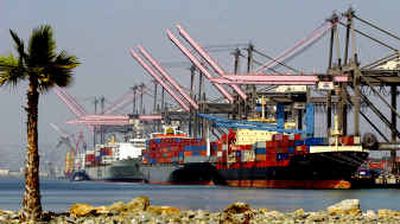Trade deficit climbs to record $55.82 billion

WASHINGTON – The U.S. trade deficit hit a record $55.82 billion in June as the country’s foreign oil bill surged to an all-time high, the government reported Friday.
Soaring energy costs also showed up in wholesale prices for July, although a big drop in food costs helped keep the overall increase in the Labor Department’s Producer Price Index down to a modest 0.1 percent.
While food costs fell by 1.6 percent in July, the biggest one-month decline in more than two years, energy prices shot up by 2.3 percent, the biggest gain in six months.
The Commerce Department’s monthly trade report showed the June imbalance was up a sharp 19.1 percent from a revised May imbalance of $46.88 billion. Exports of goods and services fell by 4.3 percent to $92.82 billion while imports climbed 3.3 percent to a record $148.64 billion.
The far bigger-than-expected jump in the deficit caught analysts by surprise. They said it would act to further slow an economy already struggling with what Federal Reserve Chairman Alan Greenspan described as a “soft patch” in the early summer.
“America is bleeding badly in the trade area,” said Sung Won Sohn, chief economist at Wells Fargo in Minneapolis. “This implies not only weaker economic growth but a weaker dollar, which will contribute to inflation down the road.”
Economic growth, as measured by the gross domestic product, slowed sharply in the April-June quarter to an annual rate of just 3 percent, down from 4.5 percent in the first quarter.
Economists said June’s huge widening of the trade gap would force the government to lower the second quarter GDP figure to an even weaker 2.5 percent.
They also said the record highs for oil prices, which topped $45 per barrel this week, would make them trim their forecasts for growth in the second half of this year. Many said second-half growth probably would come in at 3.5 percent to 4 percent.
Wall Street ended a rough week with a small gain even as investors continued to worry about the relentless rise in oil prices, which set a new record on Friday, closing at $46.58 per barrel, up $1.08 on the New York Mercantile Exchange. The Dow Jones industrial average gained 10.76 points to finish the week at 9,825.35.
“The drag we are getting from trade plus the big bite higher oil prices take out of purchasing power will translate into weaker growth,” said David Wyss, chief economist at Standard & Poor’s in New York.
The surge in the foreign energy bill was the biggest factor in June’s trade deterioration. Energy imports climbed to a record $15.30 billion, up 17.8 percent from May.
The country’s trade deficit with China climbed to a record $14.2 billion, up 17 percent from May, while the imbalance with Japan rose to $6.3 billion and the imbalance with the expanded 25-nation European Union to $10.6 billion.
The Bush administration blamed the weakness on a global economic slowdown. “Growth in the rest of the world appears to be slowing,” Treasury Secretary John Snow told reporters after an appearance in Boca Raton, Fla.
But the campaign of Bush’s Democratic rival, Sen. John Kerry, said the soaring trade deficit was an indictment of the current administration’s trade policies, which it blames for the loss of millions of manufacturing jobs over the past three years.
“This administration hasn’t come close to doing enough to enforce trade agreements and fight for jobs here at home,” said Kerry spokesman Phil Singer.
Kerry has promised that as president he would end a tax break that allows corporations to defer payment of taxes on overseas earnings and would review trade agreements to ensure they contain enforceable protections for worker rights and the environment in the trading partner countries.
Last month’s small 0.1 percent increase in wholesale prices followed a 0.3 percent decline in June as price pressures moderated at the wholesale level after sizable gains early in the year.
With crude oil prices hitting record levels again, however, analysts are predicting that prices of gasoline and other energy products will be headed higher in coming months.
Trying to make sure that inflation does not become a problem, the Federal Reserve raised a main short-term interest rate by a quarter point on Tuesday, its second rate increase this year.
Fed officials signaled that further increases would occur at a measured pace, which economists have read as an indication that the Fed will make quarter-point moves at its final three meetings of the year in September, November and December.
Outside of the volatile food and energy categories, so-called core wholesale inflation was up a modest 0.1 percent in July following a 0.2 percent June gain.
Robert Dederick, head of RGD Economics, a Chicago consulting firm, said that performance would reassure the Fed that inflation outside of energy still is contained.